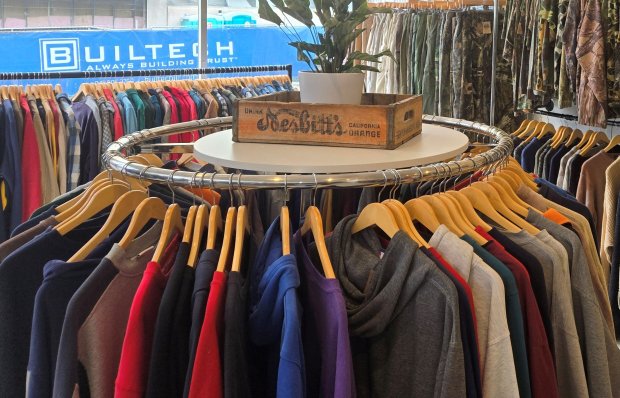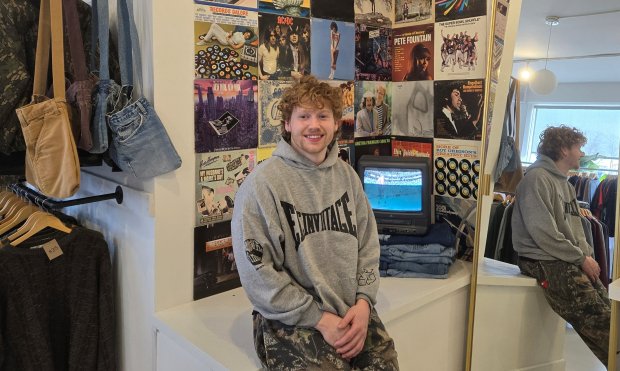David Hill wants his downtown clothing store, Elgin Vintage, to not only provide a new shopping option for buyers but to raise consciousness about how textiles affect the environment.
“I’ve always been super environmentally conscious in my life,” the 23-year-old Elgin resident said. Combining his advocacy for the planet “with my business is just cool. It just sort of ended up happening in the best way possible.”
Hill started his store by opening pop-up versions of Elgin Vintage for the last two summers before putting down roots at 23 S. Spring St. He sells previously owned clothing and accessories, including T-shirts, hoodies, sweaters, jeans, bags, sunglasses and other items, at prices that range between $20 and $30 to keep them affordable, he said.
Beyond finding a home for apparel that still has viable use, the idea is to keep clothing out of landfills. Textiles are a forgotten waste, said Hill, who graduated in December from Eureka College with an environmental studies degree.
“No one thinks about clothing being thrown away,” he said.
Americans discard about 10 million tons of textiles every year, making up about 6% of all landfill waste (plastics account for 13%), according to greenamerica.org. These are materials that can be reused by other people here and in other countries or recycled for other purposes, the nonprofit organization says.
Only about 13% of discarded textiles get recycled, according to the American Textile Recycling Service, as reported by the U.S. Environmental Protection Agency. Once they’re in a landfill, it can take up to 200 years for the materials to decompose, data shows.
A big problem is what’s known as “fast fashion,” the term used to describe how large corporations “pump out new styles by the hundreds,” Hill said. “They make (clothes) in places where they can underpay the workers and get materials super cheap that aren’t good and will fall apart. You get two or three wears, then it ends up in the garbage.”
“It’s what I’m trying to fight against,” Hill said.
Millennials and Gen Z are more aware of this type of waste, something he’s trying to tap into and expand, he said.
“I think it got put on our generation. If we don’t do something, the (damage) will be irreversible,” Hill said.

He got his start reselling shoes in high school. Later, he started thrifting, inspired by YouTube videos of people going into thrift stores and finding cool garments, he said.
The idea for Elgin Vintage actually started in 2019 while he was student at Elgin Community College. The business took off during the COVID-19 pandemic, spreading through word-of-mouth and social media while he was attending Eureka College.
“Eventually, I worked up enough courage to do an in-person event,” Hill said. “It grew and grew, and I gained a following.”
His Elgin Vintage merchandise is carefully curated — it’s not a thrift store, he says — and he does buys and trades. He likes that it can be a business that’s both environmentally forward as well as fashionable.
“It’s why I started thrifting, because I didn’t have a whole lot of money in high school and I wanted to have some style,” Hill said.
Right now, he’s really into 1970s T-shirts, which he has a lot of in the store.
Hill is grateful for the support he’s received from customers, friends and family, and is ready to be part of the businesses that are helping “bring downtown Elgin back,” he said.
Gloria Casas is a freelance reporter for The Courier-News.




